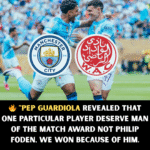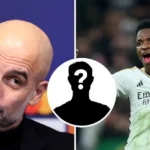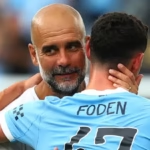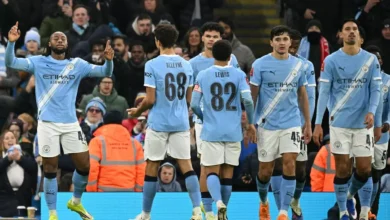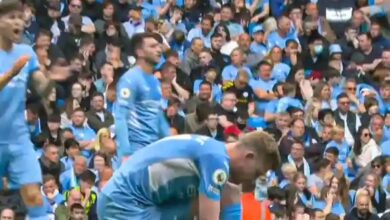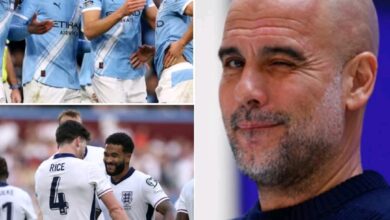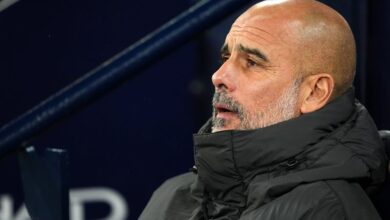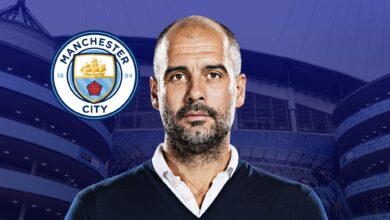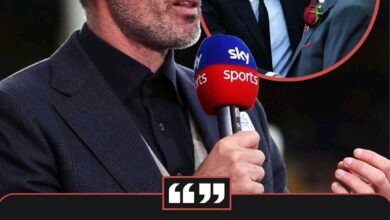Pep Guardiola has made 11 changes to the Manchester City line-up
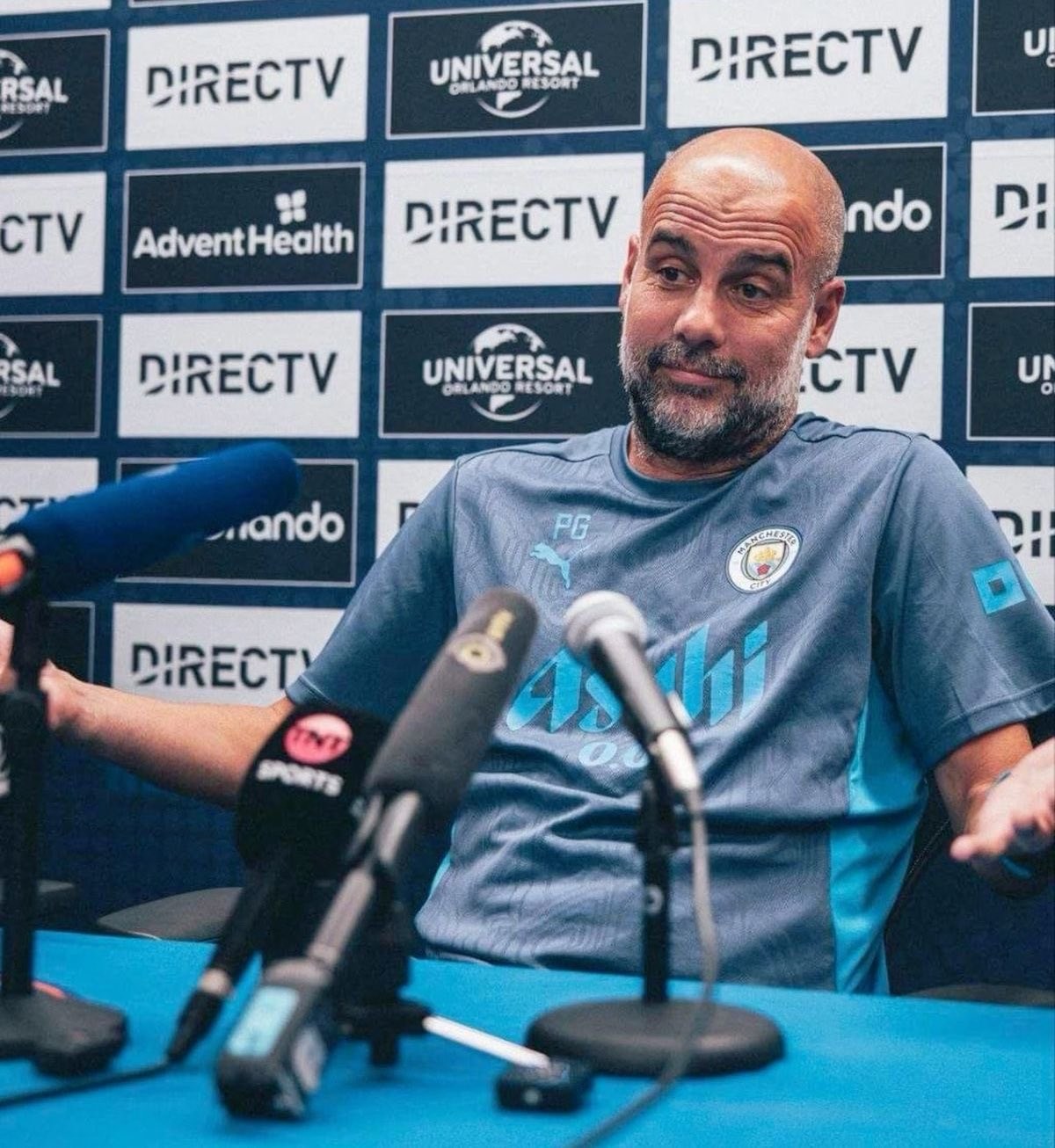
As the sun sets on what has been a challenging yet transformative 2024-25 season for Manchester City, Pep Guardiola finds himself at a crossroads that could define the trajectory of his team for years to come. The FIFA Club World Cup in the United States presents more than just another trophy opportunity for the Citizens; it represents a strategic laboratory where the Catalan maestro can experiment, evaluate, and ultimately reshape his squad for the grueling campaign ahead.
The opening fixture against Wydad AC, which City won convincingly 2-0 thanks to goals from Phil Foden and Jeremy Doku, served as an appetizer for what promises to be a fascinating tournament from a tactical and personnel perspective. However, it is Guardiola’s candid admission about his intention to heavily rotate his starting line-up for the upcoming fixtures that has captured the attention of football analysts, supporters, and competitors alike.
The Art of Squad Management: Guardiola’s Philosophy
Pep Guardiola’s approach to squad management has always been one of his defining characteristics as a coach. His ability to maintain competitive intensity across multiple competitions while keeping players fresh, motivated, and engaged has been instrumental in Manchester City’s unprecedented success over the past several years. The Club World Cup presents a unique opportunity to put this philosophy into practice on a grand stage, with implications that extend far beyond the tournament itself.
“Everybody is going to play this tournament,” Guardiola declared in his post-match interview following the victory over Wydad AC. This statement, while seemingly straightforward, carries profound implications for how Manchester City will approach not only the Club World Cup but the entire 2025-26 season. The 54-year-old manager’s emphasis on collective involvement reflects a deep understanding of modern football’s demands and the psychological aspects of squad harmony.
The Spanish tactician’s reasoning is both pragmatic and visionary. “It’s not a World Cup or European Cup, when after you finish you go on holiday – we’ll be together for 11 months. The season starts today, and finishes next May or June,” he explained. This perspective underscores the marathon nature of elite football, where success is determined not by individual moments of brilliance but by sustained excellence over extended periods.
Strategic Reinforcements: Viana’s Transfer Masterclass
The arrival of director of football Hugo Viana has already begun to reshape Manchester City’s transfer strategy, as evidenced by the quartet of new signings secured in time for the Club World Cup. The acquisitions of Rayan Ait-Nouri, Marcus Bettinelli, Tijjani Reijnders, and Rayan Cherki represent a calculated investment in both immediate competitiveness and long-term sustainability.
Each signing addresses specific needs within Guardiola’s tactical framework. Ait-Nouri brings pace, versatility, and attacking thrust from the left flank, qualities that perfectly complement City’s possession-based approach while offering defensive solidity. The French-Algerian defender’s ability to contribute in multiple phases of play makes him an ideal Guardiola player – technically proficient, tactically intelligent, and physically capable of maintaining high-intensity performance levels.
Marcus Bettinelli’s arrival strengthens City’s goalkeeping department, providing experienced cover and competition for the number one position. In Guardiola’s system, goalkeepers are expected to be comfortable with the ball at their feet, capable of initiating attacks from deep positions, and mentally resilient under pressure. Bettinelli’s Premier League experience and proven ability to perform in high-stakes situations make him a valuable addition to the squad.
Tijjani Reijnders represents perhaps the most intriguing of the new arrivals. The Dutch midfielder’s technical ability, vision, and work rate align perfectly with Guardiola’s demands for his central players. Reijnders’ immediate inclusion in the starting XI against Wydad AC demonstrates the confidence the coaching staff has in his ability to adapt quickly to City’s playing style and tactical requirements.
Rayan Cherki, the young French attacking midfielder, brings creativity, unpredictability, and goal threat to City’s forward line. His inclusion in the starting XI for his debut suggests that Guardiola sees immediate potential for the player to contribute meaningfully to the team’s attacking patterns. Cherki’s ability to operate in multiple positions across the front line provides Guardiola with additional tactical flexibility.
The Psychology of Rotation: Building Sustainable Success
Guardiola’s commitment to extensive rotation during the Club World Cup reflects a sophisticated understanding of sports psychology and team dynamics. The manager’s statement that “everybody has to be involved otherwise it’s unsustainable for a long season; physically and for team spirit” reveals the dual nature of his approach – addressing both the physical demands of modern football and the psychological needs of elite athletes.
From a physical perspective, the benefits of rotation are well-documented. Elite footballers are required to maintain peak performance levels across multiple competitions, often playing upwards of 50-60 matches per season. The accumulation of fatigue, both physical and mental, can significantly impact performance quality and increase injury risk. By ensuring that all squad members receive meaningful playing time, Guardiola can maintain higher performance standards across the entire group while reducing the likelihood of key players suffering from overexertion.
The psychological benefits of rotation are equally important, though perhaps less immediately apparent. Professional footballers are competitive individuals who thrive on regular opportunities to showcase their abilities. When players feel valued and trusted by their coach, they are more likely to maintain high training standards, support their teammates, and contribute positively to the overall team atmosphere. Conversely, players who feel marginalized or underutilized can become sources of discontent within the squad, potentially undermining team cohesion and performance.
Guardiola’s approach to rotation also serves as a form of ongoing evaluation. The Club World Cup provides an ideal environment for assessing players’ development, adaptation to tactical instructions, and ability to perform under pressure. These evaluations will inform future team selections and potentially influence transfer decisions in upcoming windows.
Learning from Adversity: The 2024-25 Season in Perspective
The context surrounding Manchester City’s Club World Cup campaign cannot be fully understood without acknowledging the challenges faced during the 2024-25 season. Liverpool’s success in claiming the Premier League title, Real Madrid’s Champions League elimination of City, and Crystal Palace’s FA Cup triumph all represent setbacks that have undoubtedly influenced Guardiola’s thinking and approach.
However, rather than viewing these results as failures, Guardiola and his coaching staff appear to have embraced them as learning opportunities. The experience of falling short in major competitions can provide valuable insights into areas requiring improvement, whether tactical, physical, or psychological. The new signings secured by Hugo Viana suggest that the club’s leadership has identified specific deficiencies and moved decisively to address them.
The Premier League title race with Liverpool was particularly instructive, highlighting the fine margins that separate success from disappointment at the highest level. The consistency and resilience required to win league titles over 38 matches demand depth of squad, tactical flexibility, and mental fortitude. Guardiola’s emphasis on rotation and squad involvement during the Club World Cup can be seen as preparation for similar challenges in the upcoming season.
The Champions League exit to Real Madrid, while disappointing, provided valuable experience for younger players and exposed areas where the squad could be strengthened. The subsequent transfer activity suggests that these lessons have been absorbed and acted upon, with new players brought in to provide additional options and raise overall squad quality.
Tactical Evolution: Adapting to New Personnel
The integration of new players inevitably requires tactical adjustments, and Guardiola’s reputation as a tactical innovator suggests that Manchester City’s playing style may evolve during the Club World Cup and beyond. The different qualities and characteristics of the new signings offer opportunities to explore alternative approaches and systems.
Ait-Nouri’s pace and attacking instincts could enable City to adopt a more direct approach in certain situations, stretching opposing defenses and creating space for creative players to operate. His ability to provide width in the final third could also allow City’s traditional wingers to drift inside and create overloads in central areas.
Reijnders’ presence in midfield could facilitate a shift toward a more dynamic, box-to-box approach in the center of the park. His energy and work rate could prove particularly valuable in high-intensity matches where City need to match their opponents’ physical commitment while maintaining their technical superiority.
Cherki’s creativity and unpredictability offer Guardiola additional options in the final third, potentially allowing for more varied attacking patterns and approaches. His ability to operate in multiple positions could prove particularly valuable in matches where City need to break down stubborn defensive setups.
The Opposition Factor: Al Ain and Beyond
Guardiola’s indication that “next game (vs Al Ain) 10 new players will be there to try and win” suggests a significant overhaul of the starting XI for City’s second Club World Cup fixture. This decision reflects both confidence in his squad’s depth and recognition of the specific challenges that Al Ain might present.
Al Ain, as representatives of Asian football, will likely approach the match with a defensive mindset, seeking to frustrate City and capitalize on any opportunities that arise. This tactical approach could provide an ideal testing ground for City’s new signings, who may be called upon to demonstrate their ability to break down organized defensive blocks and create scoring opportunities through individual brilliance or collective movement.
The decision to rotate extensively also demonstrates Guardiola’s respect for the opposition and his understanding that every match in elite football must be taken seriously. By fielding a strong team featuring numerous changes, City can maintain competitive intensity while achieving their broader objectives of player development and evaluation.
Long-term Vision: Building for 2025-26 and Beyond
The Club World Cup represents the beginning of Manchester City’s preparation for the 2025-26 season, and Guardiola’s approach reflects a long-term vision that extends beyond immediate tournament success. The experiences gained during this competition will inform team selection, tactical development, and potentially transfer decisions throughout the upcoming campaign.
The integration of new players during a competitive tournament provides valuable insights into their ability to adapt to City’s playing style under pressure. These evaluations will prove crucial as the season progresses and Guardiola faces decisions about team selection for crucial matches in the Premier League, Champions League, and domestic cup competitions.
The psychological benefits of early integration and trust-building cannot be overstated. Players who feel valued and supported from the outset of their City careers are more likely to develop into key contributors over time. Guardiola’s commitment to involving all squad members during the Club World Cup demonstrates his understanding of these dynamics and his investment in long-term success.
The Broader Context: Modern Football’s Demands
Guardiola’s approach to the Club World Cup reflects broader trends in modern football, where the demands placed on elite players continue to increase. The expansion of competitions, compressed schedules, and heightened expectations from supporters and media create challenges that require innovative solutions.
The concept of squad rotation has evolved from a luxury afforded to wealthy clubs to a necessity for sustained success. The physical and mental demands of modern football make it impossible for any individual player to maintain peak performance across an entire season without adequate rest and recovery periods.
Manchester City’s financial resources and recruitment strategy enable them to maintain squad depth that many competitors cannot match. However, the effective utilization of this depth requires careful management and strategic thinking, qualities that Guardiola has demonstrated throughout his coaching career.
Conclusion: A Strategic Gamble with Long-term Benefits
Pep Guardiola’s commitment to extensive rotation during Manchester City’s Club World Cup campaign represents more than tactical experimentation; it embodies a philosophical approach to modern football management that prioritizes long-term sustainability over short-term glory. While the decision to potentially field 10 new players against Al Ain carries inherent risks, the potential benefits – in terms of player development, squad harmony, and tactical evolution – could prove transformative for City’s prospects in the 2025-26 season and beyond.
The Club World Cup serves as both a competitive tournament and a strategic laboratory, where Guardiola can evaluate his new signings, integrate different tactical approaches, and build the foundation for another sustained period of success. The early evidence suggests that Hugo Viana’s transfer strategy has provided the Catalan coach with the tools necessary to refresh and reinvigorate his squad while maintaining the high standards that have become synonymous with Manchester City under his leadership.
As the tournament progresses, the true impact of Guardiola’s rotation policy will become clearer. However, the underlying logic – that sustainable success requires collective involvement and continuous development – appears sound. Whether this approach yields immediate trophy success or longer-term competitive advantages, it represents a fascinating case study in modern football management and the ongoing evolution of one of the game’s most successful coaching philosophies.
The road to redemption following the disappointments of 2024-25 begins with these strategic decisions at the Club World Cup. For Manchester City, success may ultimately be measured not just in trophies won, but in the sustainable foundation built for future campaigns. In this context, Guardiola’s rotation strategy appears less like a gamble and more like a calculated investment in the club’s continued evolution and success.
